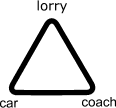Top 20 Fillers and warmers
Fillers | Lateral Thinking Puzzles
There are times when you're class is going wrong or a colleague is ill and you've been asked to cover, you have no plan, no materials and a textbook that is boring your students to tears... These fillers require no preparation and no equipment beyond a whiteboard, markers and some paper.
We present the ESL Lesson First Aid Kit!
1. Ball Pass
Language point: General lexical practice
This is a great way to reinforce fluency in any subject from a very simple,
my name is... What's your name? through to something more complicated
such as irregular verbs, sentences using the past perfect etc. For Example,
they could name a movie and to make it more exciting you could give them
a five second time limit in which to do so. (If you
don't have a ball, make a paper plane or scrunch up some paper to make
one.)
2. Board Race
Language point: Grammar/General lexical practice.
Students are doing a fairly boring grammar exercise, that is
maybe a touch too easy for some of the students or you got thrown into
the class five minutes before it starts. Use this
to inject some excitement. Divide the class into 2 or 3 teams, draw lines
across the board and say that the first team to complete the exercise
on the board wins. It's amazing how much more concentration they'll use
when they're in competition.
3. Call my Bluff
Language point: general lexical practice / Introducing
yourself
There are two nice variations on this:
1. you can get students to use a dictionary to find words and then give
two false definitions and one true.
2. You can get students to say 2 true things about themselves and 1 false.
(In nearly every class, somebody will fool you by saying 3 true things
or 3 false things.)
4. Charades
Language point: Questions / General lexical practice
Charades is a great game and although the person give the word or idea
doesn't say anything, everybody else does. Give students a word or phrase
and they then guess it, but the person who knows the word can't say
anything.
If you don't know the rules of Charades, check this Website.
5. Chinese Whispers / Telephone game
Language point: General lexical
practice / Listening / Pronunciation
Give students a phrase to whisper around the class and see it
change as it goes around.
To make the game more competitive for larger classes you can get 2 or 3 teams and see which version comes out the best. (Make sure there is a minimum of 7 players per team.)
6. End Story
Language point: General discussion
/ tenses / character / story telling
A good idea to encourage some creativity is to give students the final line of
a story. Some example ideas include:
- All I was left with was a red umbrella
- Green balloons are the secret to happiness
- I’d tell my friends, but I doubt even they’d believe me!
- You’ve got to laugh at this crazy world!
- T-shirts save lives!
7. Get me in order
Language point: Comparatives
Get all the students to stand up and ask them to stand themselves in
an order this is great revision for comparatives. Example orders include:
- Tallest to shortest
- Order of Birthdays
- Oldest to Youngest
- First name or surname Alphabetically
- Distance they live from class
8. Handshakes / Paper Planes
Language point: Introducing assessment methods /
constructive criticism
Get students to give each other a handshake and then assess the handshake
giving marks out of 10. Then get students to say why they gave the mark
they did. You can also use paper planes and do the same thing.
9. Hangman / 8 guess
Language point: General lexical practice
The traditional hangman is well known to many students who quite
frankly enjoy hanging people, but in sensitive environments you might
prefer to give students 8 chances to guess the word. (Use the number
8 and rub off 1 line for each chance gone) Interactive
Version >>

10. I love
Language point: gerunds / sports / activities
You can either get students to say what they love, this is great practice
for gerunds e.g. I love swimming or have them say something they love
about each other. It can be a real morale booster for students.
11. I hate
Language point: gerunds / sports / activities / polite disagreement
Same again, but don't let them say things they hate about each other
or it can get very ugly.
 12. Love Triangles
12. Love Triangles
Language point: agreement / disagreement / turn-taking / argumentative
Draw a triangle on the board and put three objects on each corner. For
example: Lorry, bus and car or something related to the subject you are
studying. Then ask students which is the best? You'll get some very interesting
answers.
13. Magic Wand
Language point: Future tense / conditionals
/ modals
You have just found a magic wand that allows you to change three things
in your school. You can change anything you want. How would you change
yourself, your school, your teachers, your classmates, exams and homework.
Have them discuss why it is important to make the change. Another variation
is to have them discuss what they would change if they become the headmaster
for a month.
14. Marooned
Language point: agreement / disagreement /
turn-taking / argumentative
You are marooned on a island. What five (you can use a different number,
such as seven, depending upon the size of each team) items would you
have brought with you if you knew there was a chance that you might
be stranded. Note that they are only allowed five items per team, not
per person. You can have them write their items on a piece of paper
and discuss and defend their choices with the whole group.
15. My animal
Language point: Animals / emotions / characteristics
Have students pick an animal, or some other non-human living
thing that possesses qualities or characteristics that they see in themselves.
They then write it on paper identifying the animal etc. they picked,
and explaining why they picked the one they did. For example a porcupine
as a representative because it's such a mellow, take life as it comes
- until it's threatened.
Then get students to guess each others animals
16. Psychiatrist
Language point: Characteristics / questions
select two or three people from the group to be "psychiatrist" and
them send them out of the room. the remaining members of the group chooses
a 'problem' that needs to be solved. for example-each person assumes
the characteristics of the person to his or her right. for example, if
asked the color of the "patients" hair, the person questioned
would say blonde if that is the hair colour of the person on his right.
other 'problems' could be all are the person to their left, all are one
person in the group etc...
17. Round the alphabet
Language point: large lexical chunks
Get students to go round the letters of the alphabet, example subjects
include:
- Countries
- Items I can buy
- TV Programmes
- Movies
- nouns
- verbs
- adjectives
- adverbs
18. Time bomb
Language point: questions
For this game you need a timer of some sort, a cheap egg timer is great or most
mobile phones will do the trick. You set the timer and pass it onto a student,
ask him/her a question, once answered have the student pass it onto the next
student. The student holding the timer at the time it goes off loses a life.
19. The Hotseat
Language point: General lexical practice /
questions
Get one student to sit with the back to the board and then write something
on it. The student can then ask yes/no questions (Or open questions
if you want to practice them) to find the answer. You can either control
the game or get the student to write the next item for a student of
their choice. You can also limit the game by theme to practice lexical
sets.
20. Yes/No game
Language point: General lexical practice / questions
This game is quite simple, pair students up and get them to answer questions
without using the word yes or no. I also make it clear that "know" counts
as a form of no, because otherwise they say I meant "know" not "no".
You may also want to include nodding and hesitation. This is a great
game to build fluency.
